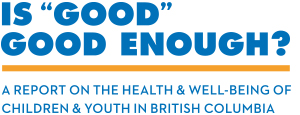Pro-social Behaviour
Indicator # 46: Pro-social Behaviour Skills
Indicator 46A: Percentage of BC kindergarten students (enrolled in public school) identified as “vulnerable” based on the Social Competence domain of the Early Development Instrument.
Indicator 46B: Percentage of BC kindergarten students (enrolled in public school) identified as “vulnerable” based on the Emotional Maturity domain of the Early Development Instrument.
Jump to Figure Notes and Sources
Key Messages
- Pro-social behaviour is behaviour or acts that are intended to benefit others (e.g., sharing, assisting others, cooperation).1 The development of prosocial behaviours in early childhood is associated with social and emotional competence throughout childhood, and is also associated with academic performance, problem-solving, and moral reasoning.2 The social and emotional skills developed in the early years of life are foundational to lifelong positive mental health and functioning.3
- The ability to use certain skills appropriately in social situations is the basis for "social competence." Often this concept is broadened to include the emotional underpinnings of positive and negative social interaction, or narrowed to specific problem behaviours in social contexts, including aggression, shyness/withdrawal, and attention deficits.4
- Studies of personal social behaviour skills—and social competence more broadly defined—have shown correlation between social behavioural skills and outcomes of health and well-being.5 While results may vary, adverse social behaviours such as aggression and attention deficits generally were correlated with poor academic outcomes, while positive social behaviours were correlated with better achievement in school.6,7,8,9
- As shown in Figures 46A.1 and 46B.1, from 2004/05 to 2012/13, there has been an increase in the percentage of kindergarten children who are classified as “vulnerable” in the Early Development Instrument subdomain areas of Social Competence and Emotional Maturity.
Figure Notes and Sources
Figure 46A.1
Note: "Vulnerable" means receiving a score below the cut-off on this domain of the Early Development Instrument.
Data source: Human Early Learning Partnership, Early Development Instrument, 2004/05-2012/13. Prepared by the Surveillance and Epidemiology Team, BC Office of the Provincial Health Officer, 2016.
Figure 46A.2
Notes: "Vulnerable" means receiving a score below the cut-off on this domain of the Early Development Instrument. Health authority is based on the residence of the child.
Data source: Human Early Learning Partnership, Early Development Instrument, 2011/12-2012/13. Prepared by the Surveillance and Epidemiology Team, BC Office of the Provincial Health Officer, 2016.
Figure 46A.3
Notes: "Vulnerable" means receiving a score below the cut-off on this domain of the Early Development Instrument. Health service delivery area is based on the residence of the child.
Data source: Human Early Learning Partnership, Early Development Instrument, 2011/12-2012/13. Prepared by the Surveillance and Epidemiology Team, BC Office of the Provincial Health Officer, 2016.
Figure 46B.1
Note: "Vulnerable" means receiving a score below the cut-off on this domain of the Early Development Instrument.
Data source: Human Early Learning Partnership, Early Development Instrument, 2004/05-2012/13. Prepared by the Surveillance and Epidemiology Team, BC Office of the Provincial Health Officer, 2016.
Figure 46B.2
Notes: "Vulnerable" means receiving a score below the cut-off on this domain of the Early Development Instrument. Health authority is based on the residence of the child.
Data source: Human Early Learning Partnership, Early Development Instrument, 2011/12-2012/13. Prepared by the Surveillance and Epidemiology Team, BC Office of the Provincial Health Officer, 2016.
Figure 46B.3
Notes: "Vulnerable" means receiving a score below the cut-off on this domain of the Early Development Instrument. Health service delivery area is based on the residence of the child.
Data source: Human Early Learning Partnership, Early Development Instrument, 2011/12-2012/13. Prepared by the Surveillance and Epidemiology Team, BC Office of the Provincial Health Officer, 2016.
References
- Eisenberg N, Fabes RA, Spinrad TL. Prosocial development (chapter 11). In Eisenberg N, volume editor, Damon W, Lerner RM, series editors. Handbook of child psychology and developmental science. 6th ed; Vol. 3. Social, Emotional, and Personality Development. New Jersey: John Wiley & Sons; 2006: 646-718
- Knafo-Noam, A, editor. Prosocial behaviour. Encyclopedia on early childhood development. Montreal, PQ: Centre of Excellence for Early Childhood Development and Strategic Knowledge Cluster on Early Child Development; [updated 2016 Feb; cited 2016 May 26]. Available from: http://www.child-encyclopedia.com/sites/default/files/dossiers-complets….
- Hawkins JD, Kosterman R, Catalano RF, Hill KG, Abbott RD. Promoting positive adult functioning through social development intervention in childhood: longterm effects from the Seattle Social Development Project. Arch Pediatr Adolesc Med. 2005 Jan;159(1):25-31.
- H. Krueger & Associates. Child and youth health and well-being indicators project: appendix J – cognitive development evidence review [prepared for the Office of the Provincial Health Officer and the Canadian Institute for Health Information]. Ottawa, ON: Canadian Institute for Health Information; 2011.
- Temcheff CE, Serbin LA, Martin-Storey A, Stack DM, Ledingham J, Schwartzman AE. Predicting adult physical health outcomes from childhood aggression, social withdrawal and likeability: a 30-year prospective, longitudinal study. Int J Behav Med. 2011 Mar;18(1):5-12.
- Pagani LS, Fitzpatrick C, Archambault I, Janosz M. School readiness and later achievement: a French Canadian replication and extension. Dev Psychol. 2010 Sep;46(5):984-94.
- D’Angiulli A, Warburton W, Dahinten S, Hertzman C. Population-level associations between preschool vulnerability and grade-four basic skills. PLoS One. 2009;4(11):e7692.
- Miles SB, Stipek D. Contemporaneous and longitudinal associations between social behavior and literacy achievement in a sample of low-income elementary school children. Child Dev. 2006 Jan-Feb;77(1):103-17.
- Algozzine B, Wang CA, Violette AS. Reexamining the relationship between academic achievement and social behaviour. J Posit Behav Interv. 2011;13(1):3-16.
